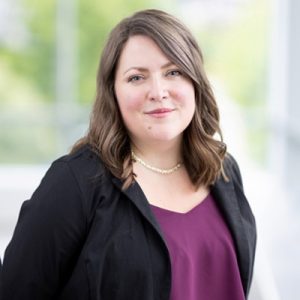With a passion for Indigenous studies, Assistant Professor Gabrielle Legault has made an impact in both the classroom and the research community. In this Q&A interview, we delve into her journey into academia, the challenges and rewards of teaching, and her current research interests.
Can you tell us a bit about your educational journey? How did you come to pursue the field you are in?
After completing my Bachelor of Arts at the University of Saskatchewan I moved to Kelowna, where I interviewed for a research assistant position with Mike Evans, which ultimately led me to pursue my master’s in Interdisciplinary Studies under his supervision. From there, I continued on to complete my PhD under the guidance of Jon Corbett.
Through my graduate work, I developed an appreciation for community-based and participatory action research, as well as Indigenous research methodologies. My early research was always centered on identity and place, and for a long time, I didn’t consider myself a health researcher. But over time, I’ve come to see how cultural identity and belonging are critical to Indigenous wellbeing—especially for urban Indigenous youth. This realization, along with community priorities, has shaped the direction of my research in ways I never initially expected.
Can you talk about your current role(s) at UBCO? What do you find enjoyable about them and what do you find challenging?
 I wear a few different hats at UBCO: I’m an Assistant Professor in Indigenous Studies, the lead of the Urban Indigenous Wellbeing Collective, and the Director of the Indigenous Health Research Unit at Vancouver Coastal Health Research Institute (which is kind of like a bridge between UBC and Vancouver Coastal Health).
I wear a few different hats at UBCO: I’m an Assistant Professor in Indigenous Studies, the lead of the Urban Indigenous Wellbeing Collective, and the Director of the Indigenous Health Research Unit at Vancouver Coastal Health Research Institute (which is kind of like a bridge between UBC and Vancouver Coastal Health).
One of the biggest challenges in my work is navigating finance procedures and the constant cycle of grant writing—it can be exhausting and sometimes disheartening. But what makes it all worthwhile is the people I get to work with. I’m fortunate to have mentors who are generous and supportive, staff who are incredibly skilled and dedicated, and community partners who see the value in research. And then there are the students—graduate and undergraduate trainees—who bring so much energy and passion to this work. I love being part of teams that value relationships, collaboration, and community-building.
Can you describe your teaching philosophy?
My teaching is rooted in experiential learning, active listening, and challenging colonial narratives. I take a growth-mindset approach through an Indigenous lens, recognizing that skills and knowledge develop through practice, interaction with others, reflection, and effort. I structure my courses in a way that supports student growth—assignments are scaffolded, feedback is detailed, and effort is valued. I also stress collaboration in the classroom. This approach aligns with Indigenous pedagogies, which emphasize self-reflection, non-hierarchical learning spaces, and the importance of taking intellectual risks. My goal is to create a classroom where students feel safe/brave enough to challenge assumptions, engage deeply, and think critically about the world around them.
What are your research interests and what do you hope to gain/solve/better understand from your research?
My current work is centered on community-identified priorities, such as wellbeing, belonging, and Indigenous identity. I also engage in youth-led research, connecting urban Indigenous youth with Elders and supporting community-developed Land-based programs, working alongside Métis and Friendship Centres.
At its core, my research seeks to understand how urban Indigenous and Métis identities are shaped, expressed, and affirmed in contemporary contexts, while also addressing systemic barriers that prevent Indigenous communities from leading and benefiting from health research. One of my primary goals is to support Indigenous self-determination in research by ensuring that Indigenous communities have the power to define research priorities, methodologies, and outcomes.
I also work to bridge the gap between research and practice by ensuring that findings are not just theoretical but lead to tangible benefits for Indigenous communities. One of the ways I try to do this is through the Indigenous Wellbeing Gathering Conference (IWGC), which is a space dedicated to bringing together Indigenous community members, researchers, students, and health practitioners to share knowledge, strengthen relationships, and advance Indigenous-led approaches to wellness. It is my hope that this conference and my own research contributes to a broader shift in how Indigenous health research is conducted—moving away from extractive approaches and toward models that prioritize community leadership, reciprocity, and long-term relationship-building.
What is the main thing you hope your students will take away from your classes?
That we all have a role and responsibility in reconciliation and decolonization.
What are some of your most memorable teaching moments?
One that stands out was bringing the cast and director of Opera Kelowna’s Wreckonciliation into my INDG 308 class (Indigenous Cultural Heritage and Intellectual Property) last year. Most of the students (myself included) had never been to an opera before, so seeing the whole class attend an evening performance together and hearing later how much they gained from the experience was memorable.
What is your proudest professional accomplishment?
Seeing complex community-based research projects through a global pandemic and continuing to have good relationships with the communities I work with.
Where do you see yourself in 5-10 years?
Tenured!
Can you tell us something (hobbies, interests etc.) that your colleagues may not know about you?
I am a voracious reader of fiction across nearly all genres, and enjoying writing it too.